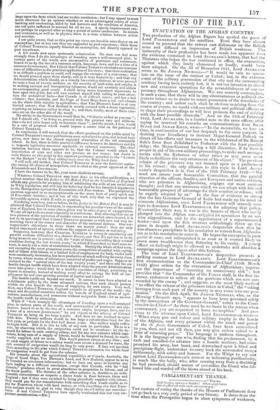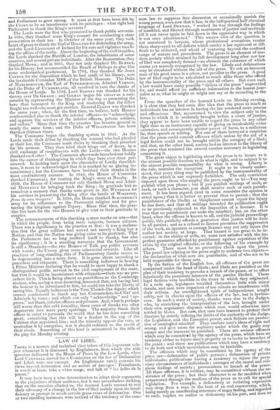PARLIAMENTARY THANKS.
And thanks, and ever thanks! Often good turns Are shuffled off with such Interment pay."
Tim custom of voting the thanks of the Houses of Parliament does not go back to a very early period of our history. It dates front the time when the Prerogative began to show symptoms of weakness, and Parliament to grow strong. It must at first have been felt by the Crown to be an interference with its privileges : what right had Parliament to thank the King's servants ?
The Lords were the first who presumed to thank public servants. In 1624, they thanked some King's counsel for conducting a state prosecution at their bar. In October of the same year, they took heart of grace to thank the Earl of HOLLAND for disbanding the army, and the Lord-Lieutenant of Ireland for his care and vigilance touch- ing the affairs of the realm. About the beginning of the civil troubles, the Lords thanked the Sheriffs of London, the inhabitants of some counties, and several private individuals. After the Restoration, they thanked Moss; and in 1681, they not only thanked Dr. BURNET, for his History, but recommended the Bench of Bishops to give him some ecclesiastical preferment. In 1701, they thanked Sir JOHN COTTON for the disposition which he had made of his library, now the invaluable Cottonian MSS. of the British Museum. The Duke of MARLBOROUGH, the Earl Of PETERBOROUGH, Admiral VERNON, and the Duke of CUMBERLAND, all received in turn the thanks of the House of Lords. In 1782, Lord RODNEY was thanked for his victory over DE GRASSE ; and GILBAY began his career as a cari- caturist by representing the Minister of the day as presenting the hero thus honoured to the King and muttering that the fellow fought too well—he must get another. General ELLIOT was thanked the same year; when, for the first time, we believe, both Houses condescended also to thank the inferior officers—to "acknowledge and approve the services of the inferior officers, private soldiers, and sailors." Since that time the practice has become general in nearly the same form ; and the Duke of WELLINGTON has been thanked thirteen times.
The Commons began the thanking system in 1641. As the Lords made their debut by thanking the counsel who had pleaded at their bar, the Commons made theirs by thanking their preacher for his sermon. They then tried their wings out of doors, by a civil exchange of compliments with the Lords—the two Houses thanked each other! The Commons afterwards launched out boldly into the career of thanksgiving in which they have ever since per- severed. In looking back upon the chronicles of Lordly thankful- ness, it must be acknowledged that it is marked by no glaring in- consistency ; but the Commons have lavished their thanks in the most contradictory manner. In 1646, the House of Commons thanked CROMWELL for routing the King's army at Naseby. In 1660, the House of Commons not only thanked MocK and Admi- ral MONTAGUE for bringing back the King ; its gratitude had so tenacious a memory that thanks were given to Mr. WYNDHAM for his services in preserving the King after the battle of Worcester, from its own troopers! In 1689, the House thanked SCHOMBERG'S army for its adherence to the Protestant religion and for pro- tecting the kingdom against Popery. Since that time, the prac tice has been for the two Houses to give vent to their gratitude in couples.
The commencement of this thanking system marks an wra—that in which the people, from being mere subjects, became citizens. There was a significancy in the practice at first : it was a declara- tion that the great soldiers had served not merely a King but a Nation, and that the Nation was giving voice to its gratitude. That the Parliament has so long confined itself to thanks, has also its significancy : it is a standing memento that the Government is still a Monarchy—the two Houses of Talk pay public servants with words ; the Crown gives more substantial rewards. Like all practices of long standing, this of Parliamentary thanks seems to be degenerating into a mere form. It is gone about according to precedent and etiquette. There is something ludicrous in hearing a Prime Minister declaring that he would be most happy to thank a distinguished public servant in the civil employment of the state, but that it would be inconsistent with etiquette—there was no pre- cedent for it. This is being almost as punctilious as the Cambridge student, who, seeing a man drowning, lamented that, not having had the honour to be introduced to him, lie could not take the liberty of saving him. Equally ludicrous is the Tom Thumb-like dignity which cannot condescend to thank any but Commanders-in-Chief and Admirals by name ; and which can only " acknowledge" and " ap- prove," not thank, inferior officers and privates. And, what is perhaps still worse than this cold formality, these votes of thanks too often degenerate into mere party sparrings. The majority thank their officer in order to persuade the world that he has done something great, conceiving that this will be a feather in the cap of the Cabinet that appointed him; and the minority oppose the vote, or neutralize it by exception, lest it should redound to the credit of their rivals. Something of this kind is announced in the bills of the play for Monday evening.



























 Previous page
Previous page